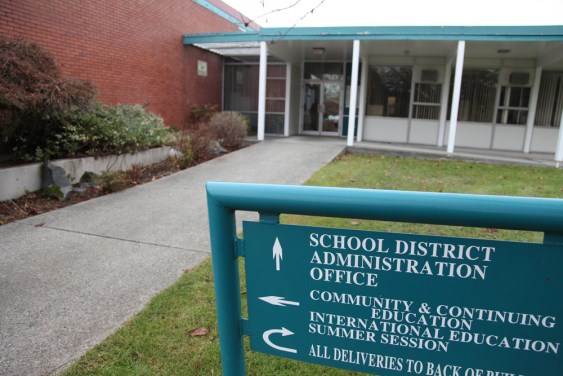Local immigration advocates are celebrating the Burnaby school district’s new procedures for students with uncertain or no immigration status.
“We’re so happy, especially with what’s happening down south,” said Byrne Creek Community School teacher Shanee Prasad, referring to U.S. President Donald Trump’s recent ban on refugees and people from seven Muslim-majority countries. “It’s really important that we make sure that families understand that our schools are open to them and it’s a safe place for their kids and that we want them to be there. It’s a great thing.”
Prasad is on the Burnaby Teachers’ Association executive and a member of School for All, a grassroots coalition of teachers and community activists advocating for all kids to be able to attend schools regardless of their family’s citizenship status.
The teachers’ union met with local trustees and the district parent advisory council a year ago to urge the district to adopt a so-called sanctuary schools policy.
The meeting included a presentation by immigration activist Harsha Walia, who said fear keeps some families with unresolved immigration issues from sending their kids to school, a problem exacerbated by schools and districts asking for families’ immigration status during the registration process.
The district’s new practices and procedures, approved by the school board last month, clarifies that immigration status is relevant but not essential for registration.
All that’s needed is proof of “ordinary residence” in B.C., according to the document. “Parents/legal guardians who do not have the necessary documents to demonstrate that they are ordinarily residents are referred to district staff,” states the document. “For parent/legal guardians who do not have the proper immigration documents, determination of eligibility for a publicly funded education will be reviewed on a case-by-case basis, with care and sensitivity.”
The document goes on to say parents worried about their immigration status being reported to federal immigration authorities “need not be afraid to come to the Burnaby school district.”
“While the school district recognizes the federal government’s legal jurisdiction over immigration matters, it is not the role of the school district to share immigration status information with external federal agencies unless legally ordered to do so,” states the document.
“This is definitely an immense relief and victory for families and advocates that have been pushing for access to schools for students who have uncertain immigration status,” said Walia of the new process.
To overcome newcomers’ fears, however, she said the district still has work to do.
“What we’re hoping to see is an actual change in the registration process,” she said. “If you look at the school board registration process, it’s still not aligned with this policy. Even though this practice is in place on paper, when you look at the registration process on their website, it still asks questions about citizenship.”
Training for frontline staff, like school secretaries and administrators, is also important, she said.
“A big part of any of these kinds of policies is that it’s meaningless unless it’s part of mandatory training,” Walia said.
Trustee Katrina Chen told the NOW the purpose of the new document is to clarify for frontline school staff what to do when unique situations come up.
“We’ve already sent this document to all the schools and administrators so they’re all aware of it,” Chen said. “In terms of training, of course, I’m pretty sure every school will let their staff know who are doing the registration process.”
For now, the district continues to require information about immigration status during the registration process.
While the district’s processes could go further, immigration advocates are happy with the Burnaby board’s initiative overall.
“It’s immense in light of what’s happening in the U.S.,” Walia said, “ensuring that locally and municipally our communities are taking a stand that people are welcome, that refugees are welcome, that undocumented students are welcome, and doing it in ways that go beyond the symbolism of it.”



